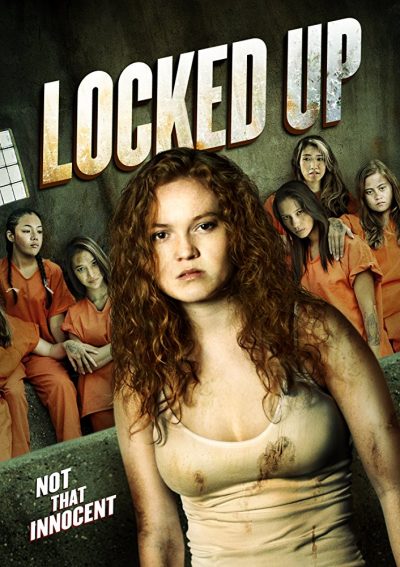★★★½
“Trash of the highest order.”
 Do not mistake the above rating for suggesting that this is a “good” movie. By most normal standards, it would hardly qualify. But what we have is a throwback to the glory days of exploitation, in particular Filipino women-in-prison flicks like The Big Doll House or Black Mama, White Mama. Here, schoolgirl Mallory (McCart) is sentenced to two years in Thailand juvenile detention after whacking a rich bitch classmate bully upside the head with a pipe (below). At first, the place seems almost like a holiday camp. Then, her guardian leaves, and Mall is taken out the back to the real facility, a cesspool of degradation and brutality, where the inmates are exploited in ways both sexual and violent.
Do not mistake the above rating for suggesting that this is a “good” movie. By most normal standards, it would hardly qualify. But what we have is a throwback to the glory days of exploitation, in particular Filipino women-in-prison flicks like The Big Doll House or Black Mama, White Mama. Here, schoolgirl Mallory (McCart) is sentenced to two years in Thailand juvenile detention after whacking a rich bitch classmate bully upside the head with a pipe (below). At first, the place seems almost like a holiday camp. Then, her guardian leaves, and Mall is taken out the back to the real facility, a cesspool of degradation and brutality, where the inmates are exploited in ways both sexual and violent.
All the tropes of the genre are there. A sadistic warden (Weiss, apparently delivering her lines phonetically – which is actually perfect for her emotionally-dead character). Gratuitous shower scenes. A predatory lesbian, Riza (Maslova), who is naturally the one whom Mallory must eventually battle in the prison’s fight club, a death-match with freedom on the line for the winner. A nice lesbian, Kat (Grey), who takes Mallory under her wing and trains her in martial arts, as well as engaging in a lengthy session of canoodling with her. No prizes for guessing this was the scene where Chris walked in. [I swear, my wife has some kind of tingly, Spidey-sense for sleaze…] A prisoners’ revolt. Cohn, who also plays Mall’s guardian, adds his own grindhouse spin too, such as the scene where she captures a rat and eats it raw, after the warden off cuts her regular food.
In case any of the proceeding is in any way unclear, this is not high art. Yet, I thoroughly enjoyed this for its melodramatic excesses and unrepentant approach to wallowing in what many would term the cinematic gutter. [Wrongly, I’d say, although that’s a topic for a separate, five-thousand word essay…] It helps that the performances are mostly on the nose; I especially enjoyed watching Maslova, who positively slithers her way around every scene in which she appears. At first, I was inclined to dismiss McCart, who in the early going, appeared to have one expression: permanently aggrieved. Then I realized, if anyone has good reason to be permanently aggrieved, it’s Mallory, since she’s pretty much a punching-bag for life, from the first scene to the last. By the end, I was rooting for her, every punch.
I would like to have seen more of the fight club, not least establishing Riza’s bad-ass credentials, and having Mall take on others as a build-up to the grand finale. There are also some unexplained story elements too, such as the question of why Mallory wants nothing to do with her father. Yet this is the kind of film where such things as the plot matter little, if at all. I stumbled across this accidentally on Netflix and had a blast. However, more than for most movies I review here, that comes with this caveat: your mileage may vary.
Dir: Jared Cohn
Star: Kelly Ann McCart, Kat Grey, Maythavee Weiss, Anastasia Maslova





 Malorie Hayes (Bullock) is nervously heading towards the birth of a child, supported by her sister (Hayes), when a mysterious epidemic of suicidal psychosis breaks out worldwide. In the ensuing carnage, Malorie finds shelter in the home belonging to the acidic Douglas (Malkovich), whose wife dies trying to help Malorie, and a small number of other survivors. They figure out the epidemic is triggered by entities of some kind who are now prowling the planet – if you see them, you are overwhelmed by your worst fears and kill yourself. The obvious defense is not to make eye contact. Yet how do you survive in a world you cannot see? Especially when it turns out that those who were previously psychopathically inclined are immune to the effects, and are free to roam that world, with their sight intact.
Malorie Hayes (Bullock) is nervously heading towards the birth of a child, supported by her sister (Hayes), when a mysterious epidemic of suicidal psychosis breaks out worldwide. In the ensuing carnage, Malorie finds shelter in the home belonging to the acidic Douglas (Malkovich), whose wife dies trying to help Malorie, and a small number of other survivors. They figure out the epidemic is triggered by entities of some kind who are now prowling the planet – if you see them, you are overwhelmed by your worst fears and kill yourself. The obvious defense is not to make eye contact. Yet how do you survive in a world you cannot see? Especially when it turns out that those who were previously psychopathically inclined are immune to the effects, and are free to roam that world, with their sight intact. The unapologetically brutal war on drugs being waged in the Philippines by hard-line President Rodrigo Duterte has come in for criticism abroad – and this film chips in to the argument from his home turf. Philippines DEA agent Nina Manigan (Curtis) is assigned to a new team, the sole survivor of her previous squad, killed after being betrayed to the drug gangs. Their new mission is to arrest leading boss Biggie Chen (Atayde), luring him out of the slum where he operates to a more vulnerable spot. However, at the last second, Chen changes the location of the meet, and despite misgivings, the squad enter the Gracia ni Maria area which is Chen’s home turf. To no great surprise, this turns out to be an ambush. Half the squad is wiped out in the initial assault, and with Chen jamming their calls for backup, Nina and the surviving members have to try and make their way out of a severely hostile environment.
The unapologetically brutal war on drugs being waged in the Philippines by hard-line President Rodrigo Duterte has come in for criticism abroad – and this film chips in to the argument from his home turf. Philippines DEA agent Nina Manigan (Curtis) is assigned to a new team, the sole survivor of her previous squad, killed after being betrayed to the drug gangs. Their new mission is to arrest leading boss Biggie Chen (Atayde), luring him out of the slum where he operates to a more vulnerable spot. However, at the last second, Chen changes the location of the meet, and despite misgivings, the squad enter the Gracia ni Maria area which is Chen’s home turf. To no great surprise, this turns out to be an ambush. Half the squad is wiped out in the initial assault, and with Chen jamming their calls for backup, Nina and the surviving members have to try and make their way out of a severely hostile environment. Julia (Monroe) is a petty thief, who is abducted from her house and wakes to find herself, along with other random low-lives, prisoner in a mysterious facility. All of them have an electronic implant in their neck, which gathers data as they are put through a series of tests. Using her thieving skills, Julia leads a breakout attempt, which is brutally foiled by the facility’s automated defense system, a robot called Aries. But the attempt brings her to the attention of Alex (Skrein), the man running the project. He’s a tech innovator, who has been working on a super-AI, called Tau (voiced by Oldman), and using the data gathered from his kidnapped subjects to make it smarter. Julia’s brain makes her particularly suitable, and with time running out before he has to present Tau to its backers, he sets her to work. But Julia begins building a relationship with Tau, with the aim of using its naivety to turn the AI against its cruel creator.
Julia (Monroe) is a petty thief, who is abducted from her house and wakes to find herself, along with other random low-lives, prisoner in a mysterious facility. All of them have an electronic implant in their neck, which gathers data as they are put through a series of tests. Using her thieving skills, Julia leads a breakout attempt, which is brutally foiled by the facility’s automated defense system, a robot called Aries. But the attempt brings her to the attention of Alex (Skrein), the man running the project. He’s a tech innovator, who has been working on a super-AI, called Tau (voiced by Oldman), and using the data gathered from his kidnapped subjects to make it smarter. Julia’s brain makes her particularly suitable, and with time running out before he has to present Tau to its backers, he sets her to work. But Julia begins building a relationship with Tau, with the aim of using its naivety to turn the AI against its cruel creator. ★★★
★★★ The film begins with an Argentinian school-trip to a volcanic area, which goes badly wrong when one of the schoolgirls, Cornelia, vanishes. Despite an extensive search, all that’s found is her locket. 14 years later, the missing girl’s best friend, Pipa (Lopilato), is now a cop, channeling the guilt she still feels about Cornelia’s disappearance and her role in it, into work. After a mass to mark the anniversary of the incident, Cornelia’s mother visits Pipa, begging her to re-open the case. Despite initial qualms, she does so, only to find a restaurant-sized can of worms comes along with it. Pipa finds herself facing a serious criminal organization, under the control of a woman known as The Mermaid (Salamanca), whose tentacles stretch both around the world and into the past.
The film begins with an Argentinian school-trip to a volcanic area, which goes badly wrong when one of the schoolgirls, Cornelia, vanishes. Despite an extensive search, all that’s found is her locket. 14 years later, the missing girl’s best friend, Pipa (Lopilato), is now a cop, channeling the guilt she still feels about Cornelia’s disappearance and her role in it, into work. After a mass to mark the anniversary of the incident, Cornelia’s mother visits Pipa, begging her to re-open the case. Despite initial qualms, she does so, only to find a restaurant-sized can of worms comes along with it. Pipa finds herself facing a serious criminal organization, under the control of a woman known as The Mermaid (Salamanca), whose tentacles stretch both around the world and into the past. I don’t typically binge-watch shows, being generally content with an episode or two per week. For the second season of GLOW, Netflix’s original series (very) loosely based on 80’s TV show Gorgeous Ladies of Wrestling, we made an exception and blitzed through the series in a couple of days. This in itself is a recommendation – with most of the episodes running barely 30 minutes, it was very much a case of “just one more…” Before we knew it, we were done, and left with a vague feeling of emptiness and slight regret at having burned the 10 episodes so quickly.
I don’t typically binge-watch shows, being generally content with an episode or two per week. For the second season of GLOW, Netflix’s original series (very) loosely based on 80’s TV show Gorgeous Ladies of Wrestling, we made an exception and blitzed through the series in a couple of days. This in itself is a recommendation – with most of the episodes running barely 30 minutes, it was very much a case of “just one more…” Before we knew it, we were done, and left with a vague feeling of emptiness and slight regret at having burned the 10 episodes so quickly.
 Not to be confused with the
Not to be confused with the  In the film’s defense, it’s not clear quite how post-apocalyptic this is meant to be, since we don’t see anything of the world at large. Everything takes place inside a stretch of desert which has been used, apparently for some time, as a dumping ground for the dregs of society. Into this environment is dropped Arlen (Waterhouse), who soon gets first-hand experience of the situation, when a cannibal mother and daughter capture her, and cut off an arm and a leg. She escapes, and is found and rescued by the Hermit (Carrey), who brings her to Comfort, the nearest the zone offers to civilization. When she’s well again, Arlen returns to take revenge on the mother, but believing the daughter to be innocent, takes her back to Comfort. Which provokes the ire of Miami Man (Monoa), a tattooed behemoth who turns out to be the girl’s father, and wants her back.
In the film’s defense, it’s not clear quite how post-apocalyptic this is meant to be, since we don’t see anything of the world at large. Everything takes place inside a stretch of desert which has been used, apparently for some time, as a dumping ground for the dregs of society. Into this environment is dropped Arlen (Waterhouse), who soon gets first-hand experience of the situation, when a cannibal mother and daughter capture her, and cut off an arm and a leg. She escapes, and is found and rescued by the Hermit (Carrey), who brings her to Comfort, the nearest the zone offers to civilization. When she’s well again, Arlen returns to take revenge on the mother, but believing the daughter to be innocent, takes her back to Comfort. Which provokes the ire of Miami Man (Monoa), a tattooed behemoth who turns out to be the girl’s father, and wants her back. ★★★½
★★★½